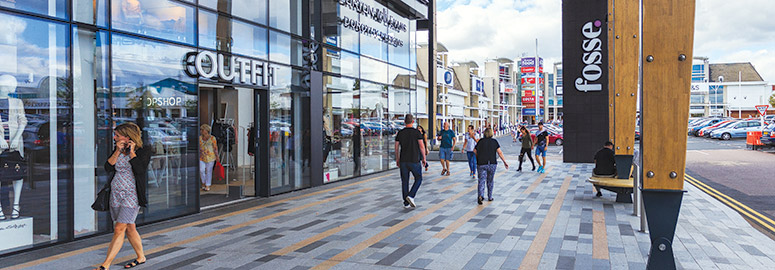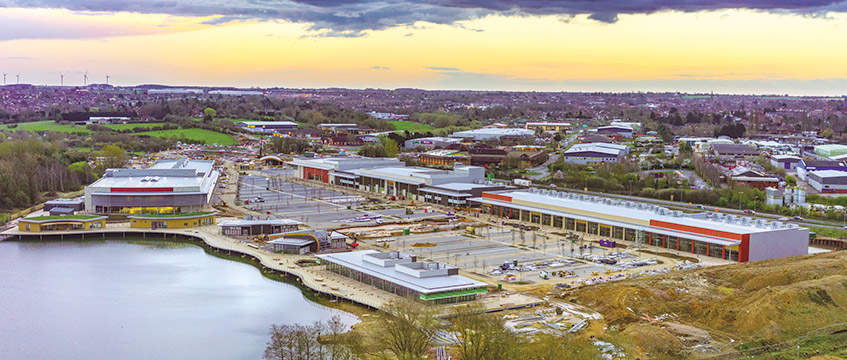This summer, the £140m Rushden Lakes retail and leisure scheme opens in Northamptonshire. For the Crown Estate – best known for its Regent Street, St James and Mayfair portfolio – the Northamptonshire project marks a new commitment to the regions. Its ambition is nothing less than to lead the regional retail market.
The Crown Estate has, of course, been investing in the regions for decades. Its £2.3bn regional retail portfolio includes trophies such as Fosse Park in Leicester, CrownGate in Worcester and Princesshay in Exeter. But Rushden – and the latest investment at Fosse Park – represent a gear change.
Although regional assets account for only about 20% of the Crown Estate’s £12bn portfolio, they could be the investments with the greatest potential for asset-managed growth.
According to Hannah Milne, head of the regional portfolio, the Crown Estate expects to concentrate on investing in its regional assets in the next few years – and is unlikely to be making new regional buys (except in Leicester, see below).
Milne explains that the policy decision to focus on existing assets, rather than acquiring new ones, follows a move to refocus on best-in-class retail schemes and follows the disposal in January 2016 of the Bath Road scheme in Slough (to Royal London Asset Management for £93.65m), and Morfa Shopping Park, Swansea (to Ashby Capital for £83.5m).
“The state of the capital markets means we are investing in our existing schemes – Fosse Park, Rushden Lake, Westgate in Oxford – and working our assets rather than acquiring new ones. But if the right scheme comes up we would obviously take a view,” she says.
The Crown Estate fights shy of the idea that it is risk-averse – and fights equally shy of comparisons with other quasi-public sector investors such as the Church Commissioners. As far as it is concerned, its peers are the big REITS, such as Land Securities and British Land.
“Risk-averse?” says Milne. “I would say our approach is that we look at every opportunity differently. Sometimes it’s about direct development, as we have at Oxford with Land Securities.”
Controversial
At Rushden, a site with a long and controversial planning history, the Crown Estate became involved only once the dust had settled on a dispute between East Northamptonshire Council (which approved it) and Kettering, Corby and Northampton councils (which feared it). Original consent in 2012 was confirmed by the government in June 2014. The Crown Estate agreed to a £70m deal with LXB 10 months later. The deal completed only when the scheme was 75% prelet – which is arguably almost the definition of risk-averse.
“Rushden came to us via our partnership arrangements. We had worked on funding the MK1 Shopping Park [for £25m in 2013] and worked with LXB in Banbury,” says Milne.
“It’s a unique setting around a lake, and it will be different from usual out-of-town schemes because we are going for smaller units, which appeals to retailers who haven’t so far traded from retail parks – names such as Jigsaw and White Stuff.”
Rushden can be – will be, Milne insists – one of a constellation of 15-20 best-in-class regional assets in the Crown Estate portfolio.
“Our direction is to look at the best property in any location – because that will be the retail property with the best long-term potential. Broadly that means larger regional schemes that offer many reasons for shoppers to visit,” she says.
This means investing in the environment, with the aim of ensuring the asset has as long a life as possible.
“This is about creating high-quality destinations, improving frontages – at Fosse Park this is already leading to 15% increases in footfall,” says Milne. “We want long-term assets that really work for the retailers in places people want to visit. A blend of leisure and retail and restaurants will always bring the right balance.”
She argues: “It’s not about getting the top rent possible – it’s about affordable rents in the best scheme in areas where there is no current oversupply of retail floorspace, and where improving the environment will add to the mix and rents could move forward.
“Rents have to be sustainable,” she says, insisting that isn’t the same as expensive.
Crown Estate-watchers – and there are many – say that if the organisation takes its flexible approach from London to the regions, there will be no stopping it.
Pick the brands
Duncan Gilliard, director at JLL, says: “It looks ahead, which means it can pick the brands rather than go for the highest rents, and it invests in the public realm. It’s less ownership than custodianship, with a long-term vision. There aren’t many investors able to do what it does.”
Some hint privately that the Crown Estate could – or should – look at diversifying into logistics property. By working its retail industry contacts, the Crown Estate has the basis of a flourishing warehousing business, it is whispered.
Milne won’t dismiss the idea entirely, but if that kind of discussion is going on in the Crown Estate’s New Burlington Place HQ it is sporadic and so far unproductive.
“You can’t count us out from doing other things in the future,” says Milne, before adding decisively, “but it’s all about retail – those relationships with retailers are really important to us now.”
A portfolio with its roots in property acquisitions as far back as 1066 is pretty much obliged to take a long-term view of its relationships. The fresh start at Rushden Lakes is genuinely fresh – but it is also a modern interpretation of the Crown Estate’s old idea: continuity.
Photograph © High Level Photography
Fuss about Fosse?

Last year the Crown Estate reached conditional agreement to buy the 12.5-acre Castle Acres site next to its Fosse Park scheme in Leicester – to transform it into a 150,000 sq ft retail and leisure development.
Planning consent, granted last year, was expected to trigger completion of the deal. Further news is eagerly awaited. The scheme, nurtured by landowners Everards for 15 years, will include Debenhams, Next and TK Maxx.
Matt Hannah, director at Innes England, says the Crown Estate has done a good job driving revenues at Fosse – even if its excellent location means it will never really struggle.
“It’s a very strong trading location. You could paint all the walls white and it would still trade well – just not as well as it does with some investment and active asset management.”
The Crown Estate took a 50% stake in the £345.5m Fosse Shopping Park, in partnership with Gingko Tree Investment, and manages the 560,000 sq ft asset on behalf of the partnership.
Rushden takes shape
LXB Retail Properties bought the 244-acre Rushden site in 2011 for what now seems a snip – just £4.5m – and a long planning battle was won in 2014.
The 380,000 sq ft scheme in the Nene Valley is due to open in July with House of Fraser (its first new store since 2008, and its first out of town) as retail anchor, along with Marks & Spencer and Primark.
The Crown Estate says Rushden Lakes has the potential to deliver the fantastic experience people are looking for, thanks to the retail and leisure mix and more than 200 acres of natural wetlands with walking trails, bird watching and a wildlife activity centre. It offers canoeing (lessons, hire, adventure trips), camping, and – in the future – bike hire.
Future phases will also include a 14-screen cinema.
Rushden will be followed in the autumn by Westgate Oxford, a 320,000 sq ft centre being beefed up to 800,000 sq ft with a host of new retailers. The Crown Estate acquired the centre in 2010 and has been developing it jointly with Land Securities.
The Crown Estate
- 4.3m sq ft of prime regional retail and leisure
- £2.4bn regional portfolio
- 100m regional shoppers visits each year
- More than 2m sq ft regional property under development
- In the last financial year the value of the business rose to £12bn and its returns were £304.1m
This article was first published on 27 March 2017
RETAIL & LEISURE SPECIAL
■ Brexit better than the 2008 recession… and the rise of the robots
Even in times of economic downturn, consumers still need to feed, wash and clothe themselves and so will continue to purchase items they require, less what they simply desire, meaning the convenience market, that in which NewRiver focuses on, will remain robust. Read more…
■ Discount chain applications power supermarket surge nationwide
Applications for new supermarkets grew 24% by square footage in 2016, with discount chains Aldi and Lidl dominating activity nationwide. Read more…
■ How to turn a profit from retail investment
An unusual deal closed in Ipswich this February – a deal that defied a trend plaguing retail landlords across the country. Read more…
■ Buying strategies of three UK shopping centre investors
“I’m wondering what a lot of investment agents are doing at the moment,” says Sovereign Centros chief executive Chris Geaves while pondering the question of how many shopping centres might change hands in 2017. Read more…
■ The new shape of retail and leisure development
Online retail, rising costs, viability issues and a discerning consumer that increasingly wants more from their shopping trip. It’s a heady mix that is piling pressure onto shopping centre developers. Against this backdrop, what are the prospects for the sector and its ability to deliver new space? Read more…
■ Crown Estate looks to its regional assets for growth prospects
This summer, the £140m Rushden Lakes retail and leisure scheme opens in Northamptonshire. For the Crown Estate – best known for its Regent Street, St James and Mayfair portfolio – the Northamptonshire project marks a new commitment to the regions. Its ambition is nothing less than to lead the regional retail market. Read more…
■ Why the UK’s thirst for coffee is good news for landlords and investors
Things have come a long way since Rowan Atkinson’s Blackadder III described the beverages served in Mrs Miggins’ London coffee shop as “brown grit in hot water”. Read more…
■ E-tail gets physical when building a brand
“We have enjoyed a lot of success online, but nothing beats the feeling you get standing outside your own store watching excited customers walk out clutching their bags,” says James Gold, co-founder of fashion accessories brand Skinnydip. Read more…
■ Can high street shoe shops step up as shopping habits shift?
Like a well-worn pair of favourite shoes that have started letting in water, part of the UK’s footwear retail sector is starting to look like it needs repairs – or even replacing. Read more…











